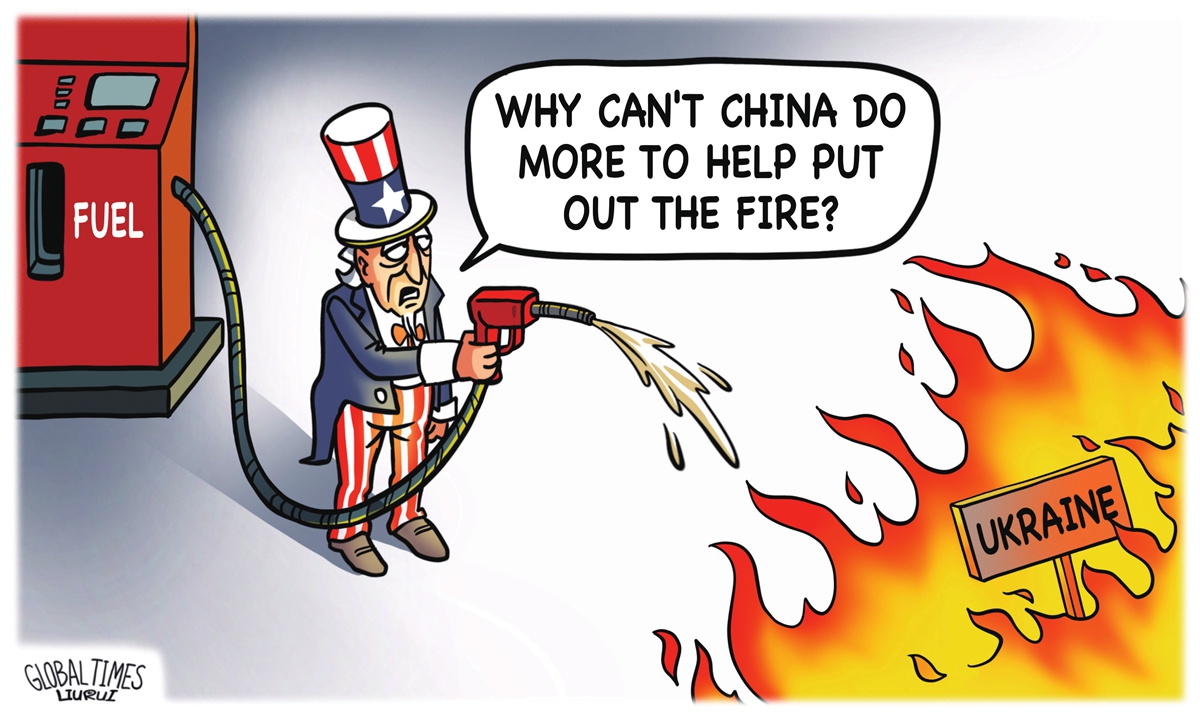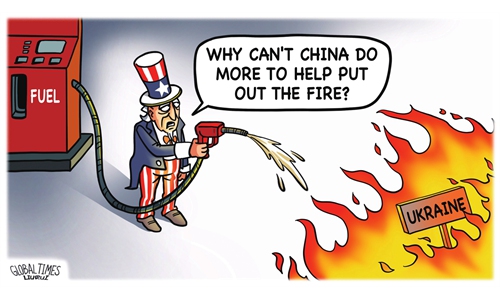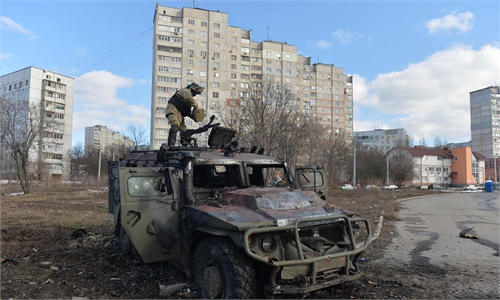The US propaganda machine is in full gear, fanning the flames of war, sowing discord between Russia and China

Illustration: Liu Rui/GT
A New York Times article on Friday argued that Russia is “losing the information war over Ukraine in much of the world, while in China, it’s winning big.” It claimed that China, as a “control freak” in terms of information, let down its digital defenses and allowed Russia’s propaganda machine to “help shape public perception of the war,” leading the Chinese internet being “overwhelmingly pro-Russia.”
As is known to all, when it comes to the war of public opinion, the West is the old hand, and is now very capable of this state apparatus which started in the UK and matured in the US. The West had a clear narrative for Russia’s so-called “invasion” of Ukraine, long before the conflict began.
The first was to exaggerate Russia’s “invasion,” and the second was to make it appear at the beginning of the conflict that Russia was conducting a surprise attack on Ukraine in order to occupy the country within a few days. But when there was not so much movement from the Russian side, the West quickly changed the tone, saying Russia was already “losing the war,” while overstating its internal discontent and the effect of Western sanctions.
The US Republican senator Lindsey Graham even openly suggested Russian President Vladimir Putin’s assassination, referring to Brutus, who was involved in assassinating the Roman emperor Julius Caesar, and Stauffenberg who was executed for attempting to kill Adolf Hitler in 1944. The standard procedure of this powerful opinion war conducted by the West also includes divorcing Russia from China, claiming that the bilateral strategic partnership has broken down, and that China’s image has been damaged because of Russia.
The truth is Chinese official media outlets in their reports use sources from all sides, including quotes from Russia, Ukraine, and Western reports, as well as their own front-line reports. It can be said that China’s media coverage is very balanced and unbiased. In covering this conflict, Chinese media do not take sides in public opinion, but view the conflict to be an unfortunate event.
It is time for the US to consider the danger of inflammatory rhetoric, the incalculable influence of public opinion on the deterioration of the situation. The US has mobilized its entire propaganda machine to portray Russia as the devil, and the current conflict as the “ultimate struggle” between democracy and “dictatorship.” Any fair description of this conflict is now defined as disinformation by the West, just like in the case of Xinjiang, where Western media will be hysterical if anyone claims there is no genocide.
But what about the Western mainstream media itself? In the age of we-media, official Western media outlets feel compelled to follow the trend of exaggeration incited by online influencers, who lack a vetting mechanism, to satisfy the bloodthirsty eagerness of its audience, leading some of the very best-selling media outlets in the West to use fake photos and videos to report the conflict.
The most extreme case was when German newspaper the Bild even used a video from the 2015 chemical explosion accident in North China’s Tianjin and said it’s from Russia’s bombing of Kiev in Ukraine. The Western press as a whole is horrible in its compliance with government actions in fanning the war frenzy, which does not deescalate the situation in any meaningful sense.
We can probably call the US the “last ideological power in history.” Almost every country, including Russia, has its own ideology, but the US is probably the last and the most powerful one to weaponize it, especially when it comes to social media, where the US has a monopoly on almost all worldwide platforms. Its blocking measures for Russian-speaking users are highly irrational, totally disregarding speech freedom slogan.
The US has stirred up public sentiment into a frenzy, forming a one-sided public opinion atmosphere. Russian side who live in this public opinion environment may make wrong decisions at times. Russia’s military actions are currently quite restrained and localized. However, this all-round anti-Russian sentiment fanning the flames could topple the public opinion and result in an unwanted outcome.
As a sovereign state, China is doing its utmost. It always tries its best to be an objective observer and mediator.
The author is a research fellow at the Chinese Academy of Social Sciences. opinion@globaltimes.com.cn



